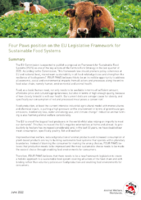
Sustainable food systems
EU legislative Framework for Sustainable Food Systems (FSFS) and better animal welfare
Our entire food value chain has an enormous impact on the climate and the way animals are kept. Food, as a basic human need, not only needs to be available in terms of sufficient amount, affordable price and cultural appropriateness, but also in terms of high enough quality, because of how closely linked it is with our health. Our current diets are a major cause for obesity, and specifically our consumption of red and processed meat poses a cancer risk.
Food production, at least the current intensive industrial agricultural model with monocultures and chemical inputs, is putting a high pressure on the environment in terms of greenhouse gas emissions, biodiversity loss, water and energy use, and climate change. At the same time, billions of farm animals suffer in industrial farming.
The EU is one of the biggest food producers in the world whilst also relying on imports to meet our demands. This has increased the EU’s negative externalities at home and abroad. Its productivity by hectare has increased considerably and, in the last 50 years, we have doubled our meat consumption, specifically poultry, fish and seafood.
Improved animal welfare, reduced production of animal products and increased consumption of plant-based products are key to building sustainable food systems that operate within planetary boundaries. Instead of blaming the consumer for making the wrong choices, FOUR PAWS believes that production needs to be improved and the most sustainable choice needs to be made the easiest choice through enabling food environments for consumers.
Therefore, FOUR PAWS believes that there needs to be a new framework legislation to create a holistic approach to a sustainable food system covering all actors of the food chain and with binding rather than voluntary policies on food production and enabling food environments for consumers.
Our calls and actions
The EU “Farm to Fork” Strategy, already stresses the “urgent need to improve animal welfare”, as essential to achieving a fair transition towards sustainable food systems. High animal welfare should be defined as a key element to what constitutes a sustainable food system and should be taken into account in every relevant part of the framework. This would build upon the relevant aspirational objectives of the EU Code of Conduct for food businesses as well as what many consumers understand to be already included in the term.
FOUR PAWS believes that animal welfare is an integral part of any sustainable food system, as a stand alone value but also as a means of achieving the other aspects of sustainability such as human and environmental health. The FSLS therefore should place ‘ensuring animal welfare’ as a key objective.
Policy recommendations:
- Evaluation of the maximum number of animals that can be raised in the European Union within planetary boundaries
- Offsetting of minimum standards for public procurement policies that respect high animal welfare criteria and that specify the serving of a certain portion of plant-based protein per week.
- Setting of clear targets across the food chain to reduce meat and dairy consumption in line with WHO dietary guidelines and planetary boundaries (with indicators and monitoring). It should include an EU Action Plan on how to achieve this (including financial and social policies, marketing and nutritional education) and require member states to draft their own National Strategic Sustainable Food Systems Plans.
- Public money should not be spent on promotional campaigns encouraging the consumption of meat and fish, if so only on products from certifiable climate/welfare friendly methods. The SFSF should allow for diverting promotional money to boosting the ‘image’ of protein crops and fruit and veg.
- The SFSF should support the development and production of sustainable European plant-based food as well as innovative alternatives to meat and dairy that mimic taste and texture. This must be accompanied by the elimination of technical and financial barriers for plant-based products and cellular agriculture.

